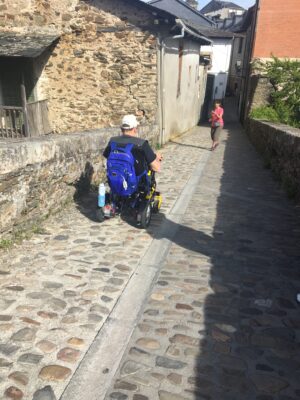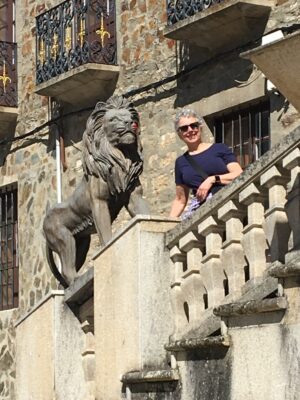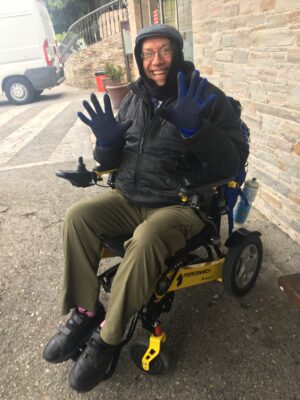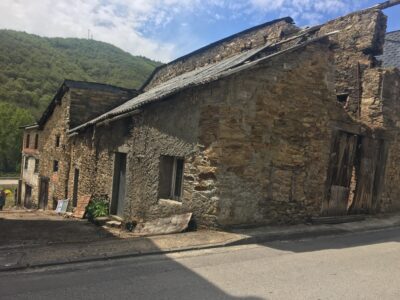
Podcast: Play in new window | Download (Duration: 19:13 — 17.9MB) | Embed
Subscribe: Apple Podcasts | Spotify | Email | RSS | More
I found myself on a pilgrimage of sounds. Disabled. Left out. Mobile. Podcasting in Spain from my wheelchair in 2019. Portugal Camino next. Anything different? Buen Camino
Blog subscribers: Listen to the podcast here. Scroll down through show notes to read the post.
Subscribe to Health Hats, the Podcast, on your favorite podcast player
Episode Notes
Prefer to read, hard-of-hearing or deaf?
Find FULL TRANSCRIPT at the end of the other show notes or download the printable transcript here
Contents with Time-Stamped Headings
to listen where you want to listen or read where you want to read (heading. time on podcast xx:xx. page # on transcript)
Eureka! It’s a Pilgrimage 02:21. 1
Missed sounds. Still a story. 04:33. 2
Day 1 to 2 Madrid to Villafranca del Bierzo 06:44. 2
Day 2 to 4 Villafranca del Bierzo to Trabadelo to Herreras 08:41. 3
Handicapped. Mobility or language? 11:06. 3
Day 5-6 Herrerias and O’Cebreiro 12:55. 4
Pilgrimage – handicaps, feeling left out 16:33. 4
Links
Notes
Grateful to and inspired by Linda DeRosa, Mary Lawler, Ann Boland, Mike DeRosa, Kate Higgins, Cynthia Meyer, Ed Lomotan
Credits
Music by permission from Joey van Leeuwen, Drummer, Composer, Arranger
Photo by Linda DeRosa
About the Show
Welcome to Health Hats, empowering people as they travel together toward best health. I am Danny van Leeuwen, a two-legged, old, cisgender, white man with privilege, living in a food oasis, who can afford many hats and knows a little about a lot of healthcare and a lot about very little. Most people wear hats one at a time, but I wear them all at once. We will listen and learn about what it takes to adjust to life’s realities in healthcare’s Tower of Babel. Let’s make some sense of all this.
To subscribe go to the blog https://health-hats.com/
Creative Commons Licensing
The material found on this website created by me is Open Source and licensed under Creative Commons Attribution. Anyone may use the material (written, audio, or video) freely at no charge. Please cite the source as: ‘From Danny van Leeuwen, Health Hats. (including the link to my website). I welcome edits and improvements. Please let me know. danny@health-hats.com. The material on this site created by others is theirs and use follows their guidelines.
The Show
Proem
As I gear up for another international adventure, I feel my aging, disabled, optimistic, fearful white man of privilege self. Our insanely successful 2019 trip to the Spanish Camino opened my eyes even more to the possibilities of travel with disabilities. Our success as a travel team rested on our flexibility, compassion, and gratitude plus planning. Working with the Carly Camino Travel Agency we booked just barely accessible accommodations, drivers with translation apps so we could communicate, and GPS WhatsApp so drivers could find me when I got lost (twice). ‘We see you, stay where you are, we’ll find you.’
My cronies and I have all struggled through ailments, surgeries, infections, and pain over the past three years, so realism tempers our optimism. This time we’re pooling resources for a support van available whenever we’re not in lodging.
A theme of this reprised episode was feeling left out. Gratefully, feeling left out hasn’t lasted or resurfaced.
Eureka! It’s a Pilgrimage
I find myself on a pilgrimage. I thought I was tagging along with my wife’s hiking group through rural, Northern Spain as a disabled person. But one of our companions, Mary, has been talking about the pilgrimage that the Camino de Santiago has been for centuries and is for her. I didn’t take that in at first. Since I can’t hike, I thought I’d focus on recording and podcasting the experience. I was especially drawn to environmental sounds in my preparation for the adventure. My ears have become more sensitive as I walk or motor around my hometown, Boston. More chirps, more barks, more chatter, more wind.
Sound sampler
David Bourne, from North Carolina, has been educating me on recording sounds around me. Headphones and a shotgun mic amplify those sounds.
Woah! Listen to the range of sounds I’ve recorded. If you’re reading, now’s the time to listen.
- Urban sounds from a balcony outside the town square in Villafranca del Bierzo
- Rural sounds of a field with cows and their cowbells along a creek in Herrerias
- The sounds of my wheelchair as I drive on a paved street in Trabadelo. You can hear the whir of the chairs electric motor
- The sounds of my wheelchair driving on cobblestones in Sarria
Missed sounds. Still a story.
I’ve missed many sounds I wanted to record. I heard a rooster crowing. Took me 10 minutes to open the equipment bag, go outside, set up the equipment and start to record. I thought, “At least a rooster keeps crowing. I’ll get it.” But no, it stopped. I recorded for 10 minutes, no crowing. But I heard my foot tapping, the elevator humming, dogs barking, the wind through the leaves… We kept chickens when we lived in West Virginia. My wife loved them. Messy, stupid animals to me. Not like bees. I enjoyed keeping bees. But then I was the one that slaughtered the chickens. I was an amateur butcher at best. Somebody had to do it. Can’t keep chickens and let them die of old age. Roosters are a hoot, though. Pompous, full of themselves, and useless – except for procreation and the morning alarm. Yet, see, even no sound has a sound story.
Now a word about our sponsor, ABRIDGE.
Use Abridge to record your doctor’s visit. Push the big pink button and record the conversation. Read the transcript or listen to clips when you get home. Check out the app at abridge.com or download it on the Apple App Store or Google Play Store. Record your health care conversations. Let me know how it went!”
Travelogue
In case you think I’m not actually traveling. Here are some clips of my travelogue. I felt so shy and hesitant just standing there speaking into my lapel. I should have pretended I’m on the subway talking into my cell phone. I know way more personal details about some people’s lives than I care to.
Day 1 to 2 Madrid to Villafranca del Bierzo
 Day 1 on the Camino de Santiago was our flight from Boston to Madrid on Iberian Airlines. I had an economy premium seat and my wife had an economy seat. I sprung for the more space and she didn’t. The more space is actually very nice. Usually I gate check my electric wheelchair and I retrieve it outside the plane. But today when we got to Madrid – no chair. Turns out they baggage checked it. So, I have to go to baggage claim and be taken by an attendant in a wheelchair. It was 6 a.m. There really wasn’t enough staff and I ended up in a holding room with about eight other people in wheelchairs. We were dropped off in this holding room and we couldn’t go to baggage claim because you had to have an attendant to leave this holding room. I was in the holding room for about an hour and finally somebody came who spoke English. I was quite handicapped without being able to speak Spanish. I got my canes out and was able to walk unassisted to baggage claim where my wife had found my chair in a special area. I would rather have lost my luggage than my chair.
Day 1 on the Camino de Santiago was our flight from Boston to Madrid on Iberian Airlines. I had an economy premium seat and my wife had an economy seat. I sprung for the more space and she didn’t. The more space is actually very nice. Usually I gate check my electric wheelchair and I retrieve it outside the plane. But today when we got to Madrid – no chair. Turns out they baggage checked it. So, I have to go to baggage claim and be taken by an attendant in a wheelchair. It was 6 a.m. There really wasn’t enough staff and I ended up in a holding room with about eight other people in wheelchairs. We were dropped off in this holding room and we couldn’t go to baggage claim because you had to have an attendant to leave this holding room. I was in the holding room for about an hour and finally somebody came who spoke English. I was quite handicapped without being able to speak Spanish. I got my canes out and was able to walk unassisted to baggage claim where my wife had found my chair in a special area. I would rather have lost my luggage than my chair.
We drove by taxi five hours to Villafranca del Bierzo. We spent two nights there seriously jet lagged. It’s six hours later here in Spain than in Boston.
Day 2 to 4 Villafranca del Bierzo to Trabadelo to Herreras
On day two we took a taxi to Ponferrada to see the castle there. This was a two-cane day, no chair. Day three we went to Trabadelo and found a fabulous Auberge run by a Dutch expatriate from Rotterdam. She came to Spain with a fellow and settled in Trabadelo and runs a gastropub and hostel, el Puente Peregrino. Amazing food. The zucchini blue cheese soup is delicious and curry. Not standard Spanish fare.
 Day four – Herreras. This time I rode my electric wheelchair seven miles. I was able to go about 98% of it on my electric wheelchair. The route was mostly on paved roads. This was the only section so far of the hundred and twenty-mile walk that is suitable for a wheelchair. 98% meant that there was two percent I couldn’t go. A stretch down a steep slope of gravel underneath a highway, which I couldn’t take my wheelchair. A very nice man from Berlin helped us carry my wheelchair down this steep rocky path, but otherwise, we did very well. We walked with a guy from Montenegro. We met people from North Carolina. We walk the several small towns population 200 – 600 people. I love that I can join my wife and friends, but frankly, I’m was bummed out that I couldn’t walk. I had to get out of my wheelchair several times to push it for a hundred meters or so to work out the cramps of sitting. I’m glad I’m not totally restricted to my chair. Everyone else is hot from walking and I’m cold from sitting. It’s between 50 and 60 degrees here.
Day four – Herreras. This time I rode my electric wheelchair seven miles. I was able to go about 98% of it on my electric wheelchair. The route was mostly on paved roads. This was the only section so far of the hundred and twenty-mile walk that is suitable for a wheelchair. 98% meant that there was two percent I couldn’t go. A stretch down a steep slope of gravel underneath a highway, which I couldn’t take my wheelchair. A very nice man from Berlin helped us carry my wheelchair down this steep rocky path, but otherwise, we did very well. We walked with a guy from Montenegro. We met people from North Carolina. We walk the several small towns population 200 – 600 people. I love that I can join my wife and friends, but frankly, I’m was bummed out that I couldn’t walk. I had to get out of my wheelchair several times to push it for a hundred meters or so to work out the cramps of sitting. I’m glad I’m not totally restricted to my chair. Everyone else is hot from walking and I’m cold from sitting. It’s between 50 and 60 degrees here.
Handicapped. Mobility or language?
A few of the places so far that we’ve been to are really wheelchair accessible. But no less than United States. There are many sidewalk cutouts, but not everywhere. The bathrooms are by far the hardest, then doorways, then space and room for the wheelchairs – very tight. It’s a good thing I can get out of my wheelchair and walk some. I carry my canes in my backpack, which is hooked to the back of my wheelchair. But really mobility is not my biggest handicapped. It’s actually the inability to speak Spanish. Jose Luis my driver speaks no English. I speak no Spanish. But we’ve been communicating quite well using the iTranslate app. I enter something. He reads it. He enters something. I read it. Or he’s driving and we speak into the app. And then listen or we use a combination of both. We’ve talked about our families, the route, and our schedule. It really works amazingly well. Why don’t we have iTranslate for health care? Doctors who can’t speak to nurses, who can’t speak to patients, who can’t speak to caregivers. This would be a great use of artificial intelligence. I think it’s less about the 1to and it’s more about the willingness to take the time and have the patience to try to communicate with each other. To look for something like iTranslate for healthcare. To use it to laugh at the foibles of poor communication or poor translation. We have so much we can do.
Day 5-6 Herrerias and O’Cebreiro
 Much of the region we’re in looks like West Virginia. I used to live in West Virginia. It has steep hills with a creek in the middle. There are cows, sheep, and the occasional donkey. There are lots of dogs. There are lumber mills, hostels, and auberges that cost five to 15 euros per night with breakfast and bunk beds. We’re staying in very nice inns with individual bathrooms. I’m not that rustic anymore, but I hitchhiked through Europe in the early 70s. I spent a night in an old school in Amsterdam with all of the non-load-bearing walls taken out. They had what looked like painted parking spaces to unroll your sleeping bag in and sleep with hundreds of other hikers, tourists, and vagabonds.
Much of the region we’re in looks like West Virginia. I used to live in West Virginia. It has steep hills with a creek in the middle. There are cows, sheep, and the occasional donkey. There are lots of dogs. There are lumber mills, hostels, and auberges that cost five to 15 euros per night with breakfast and bunk beds. We’re staying in very nice inns with individual bathrooms. I’m not that rustic anymore, but I hitchhiked through Europe in the early 70s. I spent a night in an old school in Amsterdam with all of the non-load-bearing walls taken out. They had what looked like painted parking spaces to unroll your sleeping bag in and sleep with hundreds of other hikers, tourists, and vagabonds.
Day five on the Camino adventure. I’m at the Rural Nova Ruta in O’Cebriero. It’s on the top, way on the top. It’s this stone village. It’s not a town. It’s not a city. Seems like it’s mostly a beautiful old rustic village. Everything’s downhill from here. It’s beautiful.
Left out
So, I got dropped off. And I confess to feeling a little sorry for myself that I got left. They walked and I didn’t. Goodness.
My mom. was often worried about being left out. She wanted to do everything and it really bummed her out that she couldn’t do everything. I remember having this conversation with her. I don’t know, maybe I was in my 40s or so. I said, “Mom you’re always going to be left out of something. You can only do one thing. There’s a hundred things you could do and so you’re left out of those 99 things that you decided not to do.” But you know, my mom was a Holocaust survivor. She was a German Jew. She spent five years in Netherlands in hiding. So, what did that mean? That meant that she was hidden in attics and basements sometimes in tables and chests and there was all this activity happening around her that she could hear. But she couldn’t partake and often she couldn’t see what was going on, but she could hear the sounds of people and the sounds of the street and the traffic. But she couldn’t partake. So, she felt left out. I think that’s really a different kind of left out. And here I was in my arrogant 40’s telling her she would always be left out of something. Oh my God.
Pilgrimage – handicaps, feeling left out
 A travelogue and a pilgrimage. The fear of travel with handicaps turned out completely unexpected. Language, not mobility. And my own arrogance led to my language handicap while goodwill, patience, and humor managed that. Yikes. I didn’t expect to feel so left out. Thanks to my mom for her perspective. Too bad it took me all these years to feel compassion for her. I’m looking forward to the next leg of my pilgrimage of sound. Stay tuned.
A travelogue and a pilgrimage. The fear of travel with handicaps turned out completely unexpected. Language, not mobility. And my own arrogance led to my language handicap while goodwill, patience, and humor managed that. Yikes. I didn’t expect to feel so left out. Thanks to my mom for her perspective. Too bad it took me all these years to feel compassion for her. I’m looking forward to the next leg of my pilgrimage of sound. Stay tuned.
Rooster crows
Reflection
The Spanish Camino adventure opened my eyes to sound design. I recorded birds, insects, water, people chatting, vehicles, my chair motor and on cobblestones, cows and sheep, bells in towers. Amazing stuff. Yet, after the two Spanish Camino episodes in 2019, I didn’t do much with sound design other than expanding my use of music on this podcast, mostly with my cousin Joey van Leeuwen’s assistance. I eagerly await the opportunity to record the sounds of our coastal trek. Hopefully, I can do more on the other side of Portugal. I’m working on sponsoring a sound design mastermind group of podcasters and friends. Interested? Let me know. Should be fun.
” width=”20″ height=”20″>

From Sue Spivack: Oh I love this one Danny, for your so-important meditation on “left-out” as well as for everything else you write about. So glad you could make the trip, and yes I was reading this, but I’m definitely going to listen when I get to the right moment. much love,
Sue
From Susan Carr: I’m getting lots of good, vicarious pleasure out of your upcoming adventure. Rereading this post, I wondered if you are familiar with Oliver Schroer. He was a fiddler/composer/producer/teacher who hiked the Camino de Santiago in 2004, stopping in churches along the way to play and record music. The resulting CD “Camino” is a favorite. All of his music counts as a favorite. Tragically, he died at age 52 in 2008 (leukemia). Here’s a short video clip in which he describes the trip and plays one of the “Camino” tunes. He blogged about his cancer experience, which sadly I now don’t see online. I’ll keep looking.
Here’s another quick video that displays a tribute to Schroer published in the Toronto Star. To say that it’s moving doesn’t begin to describe… and the soundtrack is another amazing Schroer tune/production.